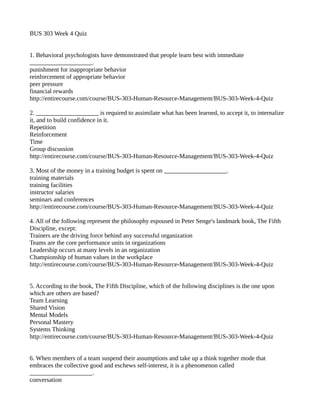BUS 303 Week 4 Quiz (Human Resource Management - entirecourse.com)
•
1 like•78 views
Report
Share
Report
Share
Download to read offline

Recommended
Recommended
More Related Content
Viewers also liked
Viewers also liked (6)
BSA 500 Entire Course (Business Systems I - entirecourse.com)

BSA 500 Entire Course (Business Systems I - entirecourse.com)
Pinterest Analytics Explained - A Simple Guide for Beginners

Pinterest Analytics Explained - A Simple Guide for Beginners
Similar to BUS 303 Week 4 Quiz (Human Resource Management - entirecourse.com)
Similar to BUS 303 Week 4 Quiz (Human Resource Management - entirecourse.com) (20)
Training and development by Neeraj Bhandari (Surkhet,Nepal)

Training and development by Neeraj Bhandari (Surkhet,Nepal)
Managing and Leading Team Dynamics Module 8 Wrap.docx

Managing and Leading Team Dynamics Module 8 Wrap.docx
InstructionsPart 6 Team Development PlanFor the project sel

InstructionsPart 6 Team Development PlanFor the project sel
How do business organizations manage change, why is it usually resisted

How do business organizations manage change, why is it usually resisted
BUS 303 Week 4 Quiz (Human Resource Management - entirecourse.com)
- 1. BUS 303 Week 4 Quiz 1. Behavioral psychologists have demonstrated that people learn best with immediate ____________________. punishment for inappropriate behavior reinforcement of appropriate behavior peer pressure financial rewards http://entirecourse.com/course/BUS-303-Human-Resource-Management/BUS-303-Week-4-Quiz 2. ____________________ is required to assimilate what has been learned, to accept it, to internalize it, and to build confidence in it. Repetition Reinforcement Time Group discussion http://entirecourse.com/course/BUS-303-Human-Resource-Management/BUS-303-Week-4-Quiz 3. Most of the money in a training budget is spent on ____________________. training materials training facilities instructor salaries seminars and conferences http://entirecourse.com/course/BUS-303-Human-Resource-Management/BUS-303-Week-4-Quiz 4. All of the following represent the philosophy espoused in Peter Senge's landmark book, The Fifth Discipline, except: Trainers are the driving force behind any successful organization Teams are the core performance units in organizations Leadership occurs at many levels in an organization Championship of human values in the workplace http://entirecourse.com/course/BUS-303-Human-Resource-Management/BUS-303-Week-4-Quiz 5. According to the book, The Fifth Discipline, which of the following disciplines is the one upon which are others are based? Team Learning Shared Vision Mental Models Personal Mastery Systems Thinking http://entirecourse.com/course/BUS-303-Human-Resource-Management/BUS-303-Week-4-Quiz 6. When members of a team suspend their assumptions and take up a think together mode that embraces the collective good and eschews self-interest, it is a phenomenon called ____________________. conversation
- 2. dialogue discussion conversion http://entirecourse.com/course/BUS-303-Human-Resource-Management/BUS-303-Week-4-Quiz 7. The intelligent career framework involves all the following ways of knowing except: When we work Why we work How we work With whom we work http://entirecourse.com/course/BUS-303-Human-Resource-Management/BUS-303-Week-4-Quiz 8. The most significant shift for a person in ____________________ is to accept the decisions of subordinates without second-guessing them. Stage I Stage II Stage III Stage IV http://entirecourse.com/course/BUS-303-Human-Resource-Management/BUS-303-Week-4-Quiz 9. Career development programs are most valuable when they are all of the following except: Directed primarily toward middle and upper management Open to all employees Modified when evaluation indicates that change is necessary Offered regularly http://entirecourse.com/course/BUS-303-Human-Resource-Management/BUS-303-Week-4-Quiz 10. Consequences of unrealistic aspirations and routine initial assignments typically include all of the following except: Low productivity Low job satisfaction Low satisfaction of growth needs Low satisfaction of self-actualization needs http://entirecourse.com/course/BUS-303-Human-Resource-Management/BUS-303-Week-4-Quiz